Diabetes is a disease that impairs the body’s ability to process blood sugar or glucose. According to the American Diabetes Association, at least 30.3 million adults in the United States have this condition.
Diabetes consists of three major types: Type 1, Type 2 and gestational diabetes.
People with Type 1 or juvenile diabetes do not produce insulin, a hormone that enables cells to use glucose. Those suffering from this condition need to take artificial insulin every day just to stay alive.
Type 2 diabetes affects how the body uses insulin. Though the body can still produce this hormone, the cells are unable to respond to it effectively.
Gestational diabetes develops during pregnancy. It causes high blood sugar, which could affect the health of both the mother and the child.
Relief From Neuropathy and Diabetes is possible.
Get advanced treatment for Neuropathy Symptoms in Tulsa and Oklahoma City – book an appointment today!
Why is managing diabetes so important?
While diabetes itself has no cure, you can treat it and keep it in check.
By following essential care tips for diabetes, such as exercising regularly, following a balanced meal plan, monitoring your blood sugar levels regularly, taking medications as prescribed and keeping your appointments with your doctor, you can prevent complications from this disease. When left unchecked, diabetes can lead to serious health problems, including diabetic neuropathy.
What is diabetic neuropathy?
Diabetic neuropathy is a type of nerve damage that can occur if you have diabetes. It’s related to high blood sugar (glucose) levels associated with diabetes, which can injure nerves throughout your body.
It most often causes damage to nerves in your legs and feet but may also affect nerves associated with your digestive system, heart, blood vessels, and urinary tract.
What are the symptoms of diabetic neuropathy?
Diabetic neuropathy consists of four main types: mononeuropathy, radiculoplexus neuropathy, autonomic neuropathy and peripheral neuropathy. You may not notice or feel anything different until the disease has done considerable damage to your nerves. The good news is that you can prevent this from happening by managing your diabetes properly.
Here’s a quick look at the symptoms for each kind of diabetic neuropathy:
Peripheral Neuropathy
The peripheral nerves of the body make up a complex network that connects the brain and the spinal cord to the internal organs, skin and muscles. Peripheral neuropathy damages these nerves, which causes pain, prevents normal sensation in the legs and arms, impairs muscle movement and disrupts communication between the brain and other organs in the body. Symptoms may include:
- Reduced ability to feel pain or temperature changes
- Tingling or burning sensation
- Sharp pains or cramps
- Loss of balance and coordination
Autonomic Neuropathy
The autonomic nervous system regulates many different functions of the body, including bowel movements, urination, digestion, heart rate, blood pressure and temperature. Damage to the nerves of this system interrupts the signals between the organs and the brain. Depending on the location of the damaged nerves and the organ(s) involved, autonomic neuropathy may cause:
- Frequent urinary tract infections or urinary retention or incontinence
- Constipation or uncontrolled diarrhea
- Slow stomach emptying (gastroparesis), causing nausea, vomiting, bloating, and loss of appetite
- Difficulty swallowing
- Changes in the way your eyes adjust from light to darkness
- Increased heart rate at rest
Radiculoplexus neuropathy (diabetic amyotrophy)
This type of neuropathy is predominantly a motor condition that affects the lumbosacral plexus, a network of nerves in the lumbar region of the body. Diabetic amyotrophy usually develops in older patients with Type 2 diabetes. Some of the symptoms are:
- Severe pain in your hips, thighs, or buttocks
- Weak and shrinking thigh muscles
- Difficulty rising from a sitting position
- Abdominal swelling
Mononeuropathy
This term refers to damage to a nerve outside the spinal cord and the brain. It often strikes without warning and causes severe pain. Additionally, it can occur in any area of the body, such as:
- Shin or foot
- Lower back or pelvis
- Front of the thigh
- Chest or abdomen
With the help of the diabetes care specialists at Neuropathy Treatment Clinic of Oklahoma, you can manage your condition effectively and help prevent diabetic neuropathy from getting worse.
What is the treatment for diabetic neuropathy?
Our medical staff takes a patient-centered, multifaceted approach to treating the symptoms related to diabetic neuropathy. They may recommend increasing your physical activity, physical therapy focused on restoring balance, and techniques for improving your diabetes control.
To address the pain and nerve dysfunction associated with neuropathy, our team often recommends Nerve Regenerating Therapy (NRT). This highly effective treatment uses a Pharmaceutical Grade Nutrient Blend and gentle electrical signals applied to the affected region to significantly reduce symptoms in 87% of patients who undergo the therapy.
Our clinic delivers quality diabetes care, utilizing NRT as a treatment for patients with symptoms from diabetic neuropathy. Dr. D’Souza, our board-certified neurologist, uses a FDA approved electric stimulation system, combined with local anesthetics, to provide relief from chronic pain.
You can expect only the finest care from our clinic. During your initial appointment we will take a full medical history, review the lab test results and provide you with an overview of our treatment plan, and answer any questions you may have about NRT. If you qualify as a candidate for our program, our diabetes care specialists will customize a treatment plan based on the extent of the nerve damage in your body and your level of pain.


